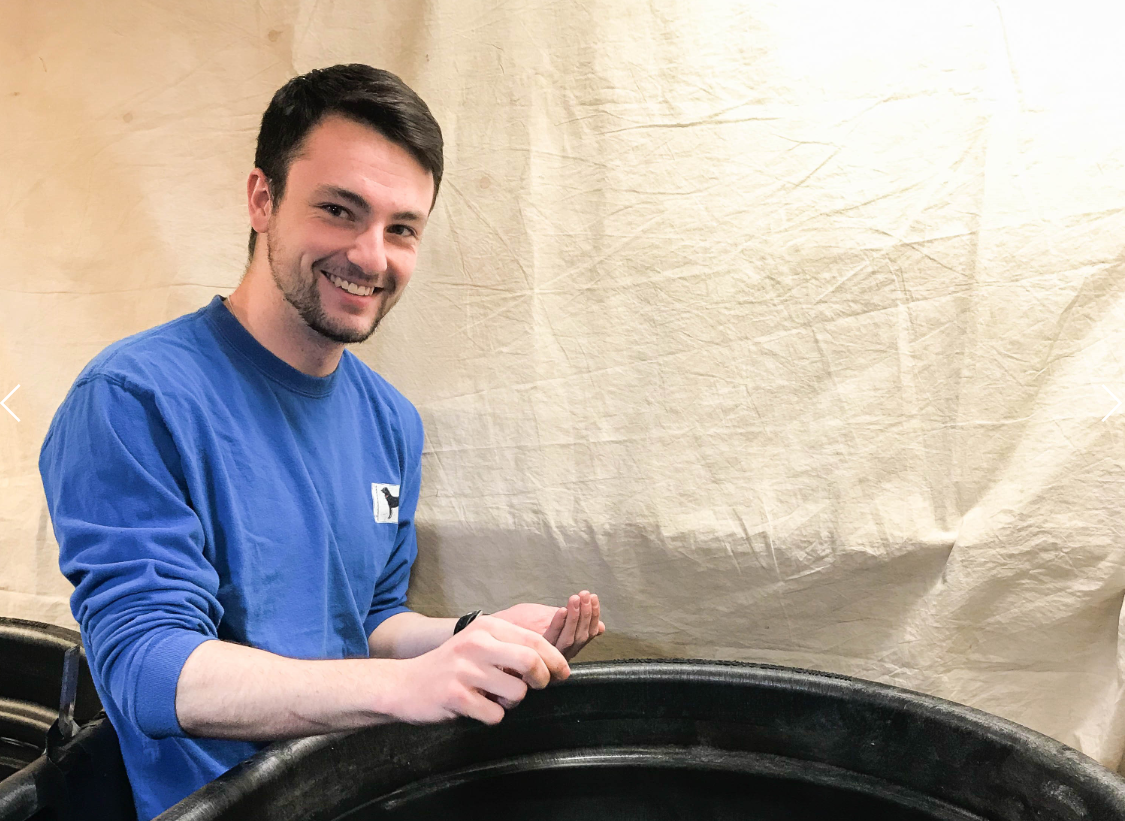As a kid, Peter Goggins spent lazy summer days trawling a dragnet along the shore in Clinton, scooping up minnows, baby bluefish, and sea robins.
As he got older, he bought a dinghy and a fishing pole and continued his passion, fishing for flounder and larger bluefish.
“I always thought the marine environment was cool, and aquafarming even better,’’ says Goggins, a junior majoring in environmental science (CAHNR). He is the founder of Pisces Atlantic, a new fish-food company that he’s running from his Middletown home.
Goggins, who was one of the winners of the School of Business’ 2019 Innovation Quest entrepreneurship competition, has created a new fish food that he believes rears healthier fish, is better for the environment, and is at least 20 percent less expensive than typical commercial fish feeds. A few weeks ago, he secured his first customer, a koi farmer in eastern Connecticut.
The Typical American Eats 16 Pounds of Fish a Year
Although he enjoys working with ornamental fish and those that are kept as pets, Goggins is most focused on nourishing the fish that people consume. The typical American consumes about 16 pounds of fish each year, according to the National Marine Fisheries Service. About half of that seafood is farmed, and that percentage is growing.
Through his research, Goggins, 20, discovered that most commercial fish food was simultaneously low-quality and expensive. Often it is a mash-up of otherwise-inedible fish species targeted specifically, and unsustainably, for use in fish feeds.
‘‘Basically, it is ‘trash fish’ –anchovies and sardines– ground up and fed to the fish that we then eat,’’ he says. Often those unremarkable fish have high mercury levels that are soon passed on to the farmed product and potentially the consumer. Furthermore, removing so much biomass from the ocean is damaging to the environment, he says, depriving other aquatic life of its food source.
But identifying the problem was easier than solving it.
With a school of goldfish and an aquarium purchased at Petco, Goggins started experimenting with fish-food formulae. The initial results were disappointing, and there were some “burials at sea.’’
But he fine-tuned his fish food, made from a combination of vegetable and insect protein, and tried his Pisces Atlantic compound on a tank of catfish.
“I fed some of them high-grade commercial feed, and some my own food, and 80 days later, there was no difference in their size,’’ he says. “I realized my food was just as good as the high-end product. That was my big moment!’’
Goggins, who can customize his blend based on the needs of a particular type of fish, says he’s been working day and night at making his product.
“I’m making about 200 pounds and sourcing materials, and I’ve built my own dehydrator. It must seem a little odd to the neighbors when I’m cutting sheet metal in the front yard,’’ he jokes.
But there is no doubt he’s hooked on his work.
“I have boxes piled in the garage that are taller than me and 50-pound bags of ingredients that I’m milling to flour,’’ he says.
Do his parents mind that his business is taking over the garage?
“Oh, it’s not just the garage,’’ he says. “It’s in the basement, the shed, and my bedroom too. My whole family helps with the work.’’
UConn Ecosystem Supported His Company
Goggins transferred to UConn as a sophomore after friends told him about the entrepreneurial opportunities here. He not only won second place in the iQ competition, he’s also won a Get Seeded competition, two Accelerate UConn competitions, and has been awarded a place in the next cohort of CCEI’s Summer Fellowship. His next goal, in addition to dramatically expanding his business, is to form an advisory board to guide its growth.
Through UConn, he has gained the business knowledge he needed and additional resources toward his company.
“I’m not a business major and I learned so much about business, patents, and financials, through the iQ program and others,’’ he says. “I also made great contacts who gave me advice, all kinds of advice, whose value is incalculable. It’s been an exceptional experience.’’
Earlier this semester, he was balancing coursework, the business, and working in a lab on campus. Sometimes sleep was difficult to fit into his schedule.
“This company is my highest priority now. I’d never seen myself doing this, being an entrepreneur,’’ he says. “One day I woke up and I was an entrepreneur; it kind of snuck up on me!’’



